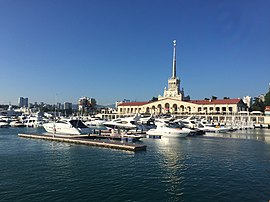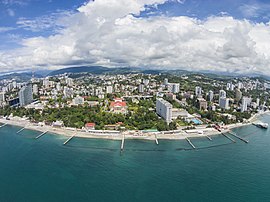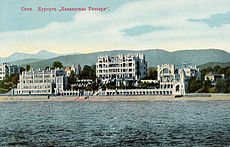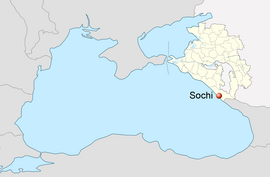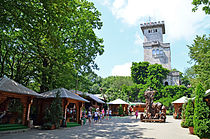
A | B | C | D | E | F | G | H | CH | I | J | K | L | M | N | O | P | Q | R | S | T | U | V | W | X | Y | Z | 0 | 1 | 2 | 3 | 4 | 5 | 6 | 7 | 8 | 9
Sochi
Сочи | |
|---|---|
|
From top: Port of Sochi, Sochi Park, Winter Theatre, Sochi Olympic Park, Adler Railway Station Bird's-eye view of Sochi | |
| Coordinates: 43°35′07″N 39°43′13″E / 43.58528°N 39.72028°E | |
| Country | Russia |
| Federal subject | Krasnodar Krai[1] |
| Founded | 1838[2][3] |
| Government | |
| • Body | City Assembly |
| • Mayor[4] | Alexey Kopaigorodsky[4] |
| Area | |
| • Total | 176.77 km2 (68.25 sq mi) |
| Elevation | 65 m (213 ft) |
| Population | |
| • Total | 343,334 |
| • Estimate (August 2020)[7] | 443,562 |
| • Rank | 52nd in 2010 |
| • Density | 1,900/km2 (5,000/sq mi) |
| • Subordinated to | City of Sochi[1] |
| • Capital of | City of Sochi[1] |
| • Urban okrug | Sochi Urban Okrug[8] |
| • Capital of | Sochi Urban Okrug[8] |
| Time zone | UTC+3 (MSK |
| Postal code(s)[10] | 354000, 354002–354004, 354008–354010, 354013, 354014, 354018, 354019, 354022, 354024, 354025, 354030, 354031, 354033, 354036, 354037, 354039, 354053–354055, 354057, 354059, 354061, 354065–354068, 354071, 354073, 354084, 354099, 354200, 354202–354214, 354216–354218, 354220, 354226, 354231, 354233, 354299, 354340, 354346, 354348, 354349, 354354, 354355, 354364, 354380, 354382, 354383, 354399, 993501 |
| Dialing code(s) | +7 862 |
| OKTMO ID | 03726000001 |
| Website | sochiadm |
Sochi (Russian: Сочи, IPA: [ˈsotɕɪ] , from Ubykh: Шъуача – seaside) is the largest resort city in Russia. The city is situated on the Sochi River, along the Black Sea in Southern Russia, with a population of 466,078 residents,[11] and up to 600,000 residents in the urban area. The city covers an area of 176.77 square kilometers (68.25 sq mi),[5] while the Greater Sochi Area covers over 3,502 square kilometers (1,352 sq mi).[5] Sochi stretches across 145 kilometers (90 mi), and is the longest city in Europe,[12] the fifth-largest city in the Southern Federal District, the second-largest city in Krasnodar Krai, and the sixth-largest city on the Black Sea.
Sochi hosted the XXII Olympic Winter Games and XI Paralympic Winter Games in 2014. It hosted the alpine and Nordic Olympic events at the nearby ski resort of Rosa Khutor in Krasnaya Polyana. It also hosted the Formula 1 Russian Grand Prix from 2014 until 2021.[13][14][15] It was also one of the host cities for the 2018 FIFA World Cup.
Etymology
The general consensus (also recognized by the city's own website[16]) is that the name "Sochi" (Russian: Сочи) is the Russified form of the Circassian "Ş̂açə" (Adyghe: Шъачэ) which in turn is of Ubykh-Circassian origin, coming from the Ubykh name "Ş̂uaça" (Ubykh: Шъуача).[17][18][16] It is a compound made up from the two Ubykh words "шъуа" (sea) and "ча" (side) and roughly translates to "Seaside/coast".[18] There are other claims and theories, according to Georgian sources, the word comes from the Georgian word for "fir", "soch'i" (Georgian: სოჭი).[19]
History
Colchis 13th century BC–63 AD
Achaemenid Empire 511 BC–330 BC
Kingdom of Pontus 111 BC–62 BC
Roman Empire 62 BC–337 AD
Kingdom of Lazica 337–697
Byzantine Empire 697–786
Kingdom of Abkhazia 778–1008
Kingdom of Georgia 1008–1490
Mongol Empire 1242–1259
Principality of Abkhazia 1491–1829
Ottoman Empire 1578–1829
Circassia 1829–1864
Russian Empire 1864–1917
Russian Republic 1917–1918
Russian Soviet Federative Socialist Republic 1918
Georgian Democratic Republic 1918–1919
South Russia 1919–1920
Russian Soviet Federative Socialist Republic 1920–1991
Russian Soviet Federative Socialist Republic 1922–1991
Russian Federation 1991–present
Early history
Before the whole area was conquered by Cimmerian, Scythian and Sarmatian invaders, the Zygii (Proto-Adyghe) people lived in Lesser Abkhazia under the Kingdom of Pontus, then the Roman Empire's influence in antiquity. From the 6th to the 11th centuries, the area successively belonged to the Georgian kingdoms of Lazica and Abkhazia, who built a dozen churches within the city boundaries, the later was unified under the single Georgian monarchy in 11th-century, forming one of the Saeristavo, known as Tskhumi extending its possessions up to Nicopsis. The Christian settlements along the coast were destroyed by the invading Alans, Khazars, Mongols and other nomadic empires whose control of the region was slight. The northern wall of an 11th-century Byzantine basilica still stands in the Loo Microdistrict.[20]
Between the 13th and 15th centuries, the Republic of Genoa had the monopoly of the trade on the shores of the Black Sea, and established colonies and trading posts in the region of the present-day Sochi, the large ones were Layso and Costa.[21][22][23]
From the 14th to the 19th centuries, the region was dominated by the Abkhaz, Ubykh and Adyghe tribes, the current location of the city of Sochi (Ş̂açə) known as Ubykhia was part of historical Circassia, and was controlled by the native people of the local mountaineer clans of the north-west Caucasus, nominally under the sovereignty of the Ottoman Empire, which was their principal trading partner in the Islamic world.
Russian Empire
The coastline was occupied by Russia in 1829 as a result of the Russo-Circassian War and the Russo-Turkish War, 1828–1829; however, the Circassians did not accept the Russian control over Circassia and kept resisting the newly established Russian outposts along the Circassian coast (Adyghe: Адыгэ хы Iушъо).[3][24] Provision of weapons and ammunition from abroad to the Circassians caused a diplomatic conflict between the Russian Empire and the British Empire that occurred in 1836 over the mission of the Vixen.[25]
The Russians had no detailed knowledge of the area until Baron Feodor Tornau investigated the coastal route from Gelendzhik to Gagra, and across the mountains to Kabarda, in the 1830s.[citation needed] In 1838, the fort of Alexandria, renamed Navaginsky a year later, was founded at the mouth of the Sochi River as part of the Black Sea coastal line, a chain of seventeen fortifications set up to protect the area from recurring Circassian resistance. At the outbreak of the Crimean War, the garrison was evacuated from Navaginsky to prevent its capture by the Turks, who effected a landing on Cape Adler soon after.
The last battle of the Russo-Circassian War, the Battle of Qbaada, took place in 1864, and the Dakhovsky fort was established on the site of the Navaginsky fort. The end of the Caucasian War was proclaimed at Qbaada tract (modern Krasnaya Polyana) on June 2 (21 May O.S.), 1864, by the manifesto of Emperor Alexander II, read aloud by Grand Duke Michael Nikolaevich of Russia.[3] The city was the administrative capital of the Sochinsky Okrug.
Circassian genocide
By the end of Russo-Circassian War, the Russian Empire aimed to systematically destroy the native Circassian people in the region[26][27][28] and several atrocities were committed by the Russian forces.[29][30] As a result, almost all Ubykhs and a major part of the Circassians who lived on the territory of modern Sochi, were either killed or expelled to the Ottoman Empire in the Circassian Genocide. According to Russian sources, Sochi's population fell from roughly 100,000, to 98.[31][32][2]
Starting in 1866 the coast was actively colonized by Russians, Armenians, Ukrainians, Belarusians, Greeks, Germans, Georgians and other people from inner Russia.[3][24] In 1874–1891, the first Russian Orthodox church, St. Michael's Church, was constructed, and the Dakhovsky settlement was renamed Dakhovsky Posad on April 13, 1874 (O.S.). In February 1890, the Sochi Lighthouse was constructed. In 1896, the Dakhovsky Posad was renamed Sochi Posad (after the name of local river) and incorporated into the newly formed Black Sea Governorate. In 1900–1910, Sochi burgeoned into a sea resort. The first resort, "Kavkazskaya Riviera", opened on June 14, 1909 (O.S.). Sochi was granted town status in 1917.[3]
-
Plan of Fort Alexandria at the mouth of Sochi, which initiated the city of Sochi
-
The landing of Nikolay Raevsky's squadron at Subashi, 1839 by Ivan Aivazovsky
-
Adyghe strike on a Russian Military Fort in 1840 during the Russian-Circassians War
-
The "Kavkazskaya Riviera" resort in Sochi, ca. 1909
-
Map of Sochi in 1913 (Russian edition)
Soviet time
During the Russian Civil War, the littoral area saw sporadic armed clashes involving the Red Army, White movement forces, and the Democratic Republic of Georgia. As a result of the war Sochi has become Russian territory. In 1923, Sochi acquired one of its most distinctive features, a railway which runs from Tuapse to Georgia within a kilometer or two of the coastline. Although this branch of the Northern Caucasus Railway may appear somewhat incongruous in the setting of beaches and sanatoriums, it is still operational and vital to the region's transportation infrastructure.[3]
Sochi was established as a fashionable resort area under Joseph Stalin, who had his favorite dacha built in the city. Stalin's study, complete with a wax statue of the leader, is now open to the public.[33] During Stalin's reign the coast became dotted with imposing Neoclassical buildings, exemplified by the opulent Rodina and Ordzhonikidze sanatoriums. The centerpiece of this early period is Shchusev's Constructivist Institute of Rheumatology (1927–1931). The area was continuously developed until the demise of the Soviet Union.[3]
Modern Russia
Following Russia's loss of the traditionally popular resorts of the Crimean Peninsula (transferred from the Russian SFSR to the Ukrainian SSR in 1954 by Nikita Khrushchev), Sochi emerged as the unofficial summer capital of the country.[34] In 1961, Soviet officials decided to expand the city limits by forming a Greater Sochi which extended for 140 kilometers from the southern parts of Tuapse to Adler. In July 2005, Russia submitted a successful bid for hosting the 2014 Winter Olympics in the city, spending around $51 billion in the process.[35]
In 2019, an area in the Imereti Lowlands was divided from Adlersky City District and formed as a separate urban-type settlement named Sirius. It was later designated as a federal territory.[36]
-
Ordzhonikidze resort, built in 1937–1955
-
Promenade in Sochi, 1973
-
St. Vladimir Church, built in 2005–2011
Geography
Greater Sochi is elongated along the Black Sea coast for 145 kilometers (90 mi). Sochi is approximately 1,603 kilometers (996 mi) from Moscow.[37]
The city of Sochi borders with Tuapsinsky District in the northwest, with Apsheronsky District and with Maykopsky District of the Republic of Adygea in the north, with Mostovsky District in the northeast, and with Georgia/Abkhazia in the southeast. From the southwest, it is bordered by the Black Sea.
The vast majority of the population of Sochi lives in a narrow strip along the coast and is organized in independent microdistricts (formerly settlements). The biggest of these microdistricts, from the northwest to the southeast, are Lazarevskoye, Loo, Dagomys, central Sochi (Tsentralny City District), Khosta, Matsesta, and Adler. The whole city is located on the slopes of the Western Caucasus which descend to the Black Sea and are cut by the rivers. The biggest rivers in Sochi are the Mzymta and the Shakhe. Other rivers include the Ashe, the Psezuapse, the Sochi, the Khosta, and the Matsesta. The Psou River makes the border with Abkhazia.
The northeastern part of the city belongs to the Caucasian Biosphere Reserve which is a World Heritage Site spanning areas in Krasnodar Krai and Adygea. Almost the whole area of the Greater Sochi, with the exception of the coast and of the area which belong to the Caucasian Biosphere Reserve, are included into Sochi National Park.
Sochi has a humid subtropical climate[38][39] with mild winters (average 11 °C (52 °F) during the day and 4 °C (39 °F) at night) in the period from December to March and warm summers (average 24 °C (75 °F) during the day and 16 °C (61 °F) at night) in the period from May to October.
Layout and landmarks
Sochi is unique among larger Russian cities as having some aspects of a subtropical resort. About two million people visited Greater Sochi each summer as of 2014,[40] when the city is home to the annual film festival "Kinotavr" and a getaway for Russia's elite.
-
Sochi's quay
-
Hotels
-
Aerial view of Sochi
-
Monument to Peter I in the seaport berth
A UNESCO World Heritage Site, the 2,957 square kilometers (731,000 acres) Caucasus Nature Reserve, lies just north from the city.[41] Sochi also has the region's most northerly tea plantations.
Climate
Sochi has a humid subtropical climate (Köppen climate classification Cfa),[38] at the lower elevations. Its average annual temperature is 18.9 °C (66.0 °F) during the day and 11.5 °C (52.7 °F) at night. In the coldest months—January and February—the average temperature is about 10 °C (50 °F) during the day, above 3 °C (37 °F) at night and the average sea temperature is about 9 °C (48 °F). In the warmest months—July and August—the temperature typically ranges from 25 to 29 °C (77 to 84 °F) during the day, about 20 °C (68 °F) at night and the average sea temperature is about 23–27 °C (73–81 °F). Yearly sunshine hours are around 2,200. Generally, the summer season lasts three months, from June to September. Two months—April and November—are transitional; sometimes temperatures reach 20 °C (68 °F), with an average temperature of around 16 °C (61 °F) during the day and 9 °C (48 °F) at night. December, January, February and March are the coldest months, with average temperature (of these four months) 11 °C (52 °F) during the day and 4 °C (39 °F) at night. Average annual precipitation is about 1,700 millimeters (67 in).[2][39][42] Sochi lies at 8b/9a hardiness zone, so the city supports different types of palm trees.[37] Sochi is situated on the same latitude as Nice but strong cold winds from Asia make winters less warm. In fact, temperatures drop below freezing every winter. The highest temperature recorded was 39.4 °C (102.9 °F), on July 30, 2000, and the lowest temperature recorded was −13.4 °C (7.9 °F) on January 25, 1892.[43]
| Climate data for Sochi (1991–2020, extremes 1870–present) | |||||||||||||
|---|---|---|---|---|---|---|---|---|---|---|---|---|---|
| Month | Jan | Feb | Mar | Apr | May | Jun | Jul | Aug | Sep | Oct | Nov | Dec | Year |
| Record high °C (°F) | 22.4 (72.3) |
23.5 (74.3) |
30.0 (86.0) |
33.7 (92.7) |
34.7 (94.5) |
35.2 (95.4) |
39.4 (102.9) |
38.5 (101.3) |
36.0 (96.8) |
32.1 (89.8) |
29.1 (84.4) |
23.5 (74.3) |
39.4 (102.9) |
| Mean daily maximum °C (°F) | 9.9 (49.8) |
10.4 (50.7) |
12.7 (54.9) |
17.0 (62.6) |
21.2 (70.2) |
25.4 (77.7) |
27.9 (82.2) |
28.6 (83.5) |
25.2 (77.4) |
20.7 (69.3) |
15.6 (60.1) |
12.0 (53.6) |
18.9 (66.0) |
| Daily mean °C (°F) | 6.3 (43.3) |
6.5 (43.7) |
8.6 (47.5) |
12.3 (54.1) |
16.6 (61.9) |
20.9 (69.6) |
23.7 (74.7) |
24.3 (75.7) |
20.5 (68.9) |
16.2 (61.2) |
11.4 (52.5) |
8.3 (46.9) |
14.6 (58.3) |
| Mean daily minimum °C (°F) | 3.8 (38.8) |
3.7 (38.7) |
5.6 (42.1) |
9.0 (48.2) |
13.3 (55.9) |
17.4 (63.3) |
20.0 (68.0) |
20.7 (69.3) |
16.9 (62.4) |
13.1 (55.6) |
8.5 (47.3) |
5.7 (42.3) |
11.5 (52.7) |
| Record low °C (°F) | −13.4 (7.9) |
−12.6 (9.3) |
−7.0 (19.4) |
−5.0 (23.0) |
3.0 (37.4) |
7.1 (44.8) |
12.6 (54.7) |
10.4 (50.7) |
2.7 (36.9) |
−3.2 (26.2) |
−5.4 (22.3) |
−8.3 (17.1) |
−13.4 (7.9) |
| Average precipitation mm (inches) | 177 (7.0) |
134 (5.3) |
133 (5.2) |
109 (4.3) |
107 (4.2) |
95 (3.7) |
120 (4.7) |
106 (4.2) |
140 (5.5) Zdroj:https://en.wikipedia.org?pojem=Sochi,_Russia Text je dostupný za podmienok Creative Commons Attribution/Share-Alike License 3.0 Unported; prípadne za ďalších podmienok. Podrobnejšie informácie nájdete na stránke Podmienky použitia.
Analytika
Antropológia Aplikované vedy Bibliometria Dejiny vedy Encyklopédie Filozofia vedy Forenzné vedy Humanitné vedy Knižničná veda Kryogenika Kryptológia Kulturológia Literárna veda Medzidisciplinárne oblasti Metódy kvantitatívnej analýzy Metavedy Metodika Text je dostupný za podmienok Creative
Commons Attribution/Share-Alike License 3.0 Unported; prípadne za ďalších
podmienok. www.astronomia.sk | www.biologia.sk | www.botanika.sk | www.dejiny.sk | www.economy.sk | www.elektrotechnika.sk | www.estetika.sk | www.farmakologia.sk | www.filozofia.sk | Fyzika | www.futurologia.sk | www.genetika.sk | www.chemia.sk | www.lingvistika.sk | www.politologia.sk | www.psychologia.sk | www.sexuologia.sk | www.sociologia.sk | www.veda.sk I www.zoologia.sk | ||||

